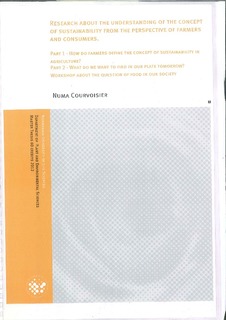| dc.description.abstract | The concept of sustainability has been increasingly used during the last two decades in response to the realization of the issues the food system is facing. If this concept sounds like a key for solving those issues, there is a wide diversity of interpretations of the idea behind the term. Obviously, no entity within the system would claim to be “unsustainable”. As a consequence, there is a confusion regarding what is sustainable, and what is not.
The goal of this research is to understand how the two most important actors of the food system, the farmers and the consumers, perceive the concept of sustainability.
The first part of the research focus on understanding how the farmers define the concept of sustainability and what are to them the essential elements needed in order achieve a sustainable agriculture. The second part seeks at understanding what the consumer expect to have in the food system of tomorrow.
In the first part of the thesis, farmers answered a survey in which they could express their vision of the concept of sustainability. The results showed that farmers consider the same elements specialists describe as essential such as adapted agronomic practices and ecological management of the farm. Nevertheless, farmers consider a whole set of social and human features as fundamental. For example, crop rotation is an essential agronomic practice that maintains the soil and its fertility, but the farmer also needs to have a good family quality of life and respect for the job he is doing. Those non-countable and difficult to evaluate elements are as important as the usual agronomic consideration. The study suggests that those social and human features must be taken into account when evaluating the sustainability of a system.
In the second part, a workshop has been run in Neuchâtel (Switzerland). Participants, usually consumers from a wide diversity of social background had the chance to learn more about the realities of the current food system in our modern society and to express their wish regarding what they want to have in their plate tomorrow. Results suggest that the participants want to have local, seasonal and high quality food. Such as it is the case in the first part, the participants consider social and human elements such as respect for people, especially producers, and communication as fundamental features for the food system of tomorrow.
Those two parts suggest that the definition of the concept of sustainability is complex. It includes quantitative elements that can easily be measured and monitored. Nevertheless, both farmers and consumers consider qualitative elements as cornerstone of the sustainability of the farm, and more generally of the food system. Those elements are much more difficult to evaluate (maybe impossible for some), but they are fundamental. A system that meets all the agronomic criteria for sustainability will not sustained itself if the farmer is an unhappy man overwhelmed by unfair considerations regarding his job.
An ultimate definition of sustainability is the baseline for establishing global movement toward it. It must however consider the perspective of all the entities within the system, and take both quantitative and qualitative elements into account. | no_NO |
